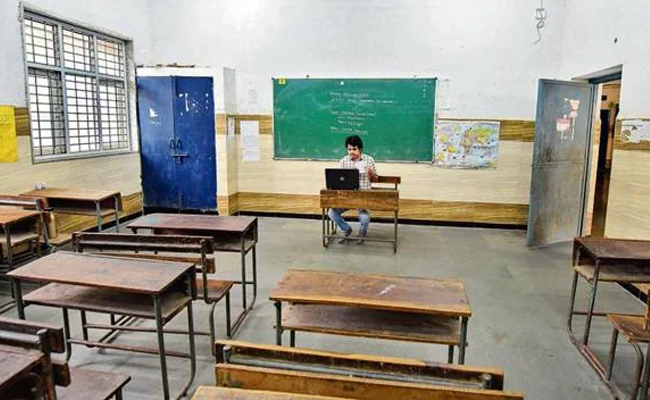Cape Town (AP): At least 242 million children in 85 countries had their schooling interrupted last year because of heatwaves, cyclones, flooding and other extreme weather, the United Nations Children's Fund said in a new report Friday.
UNICEF said it amounted to one in seven school-going children across the world being kept out of class at some point in 2024 because of climate hazards.
The report also outlined how some countries saw hundreds of their schools destroyed by weather, with low-income nations in Asia and sub-Saharan Africa hit especially hard.
But other regions weren't spared the extreme weather, as torrential rains and floods in Italy near the end of the year disrupted school for more than 900,000 children. Thousands had their classes halted after catastrophic flooding in Spain.
While southern Europe dealt with deadly floods and Asia and Africa had flooding and cyclones, heatwaves were “the predominant climate hazard shuttering schools last year,” UNICEF said, as the earth recorded its hottest year ever.
More than 118 million children had their schooling interrupted in April alone, UNICEF said, as large parts of the Middle East and Asia, from Gaza in the west to the Philippines in the southeast, experienced a sizzling weekslong heatwave with temperatures soaring above 40 degrees Celsius (104 Fahrenheit).
“Children are more vulnerable to the impacts of weather-related crises, including stronger and more frequent heatwaves, storms, droughts and flooding,” UNICEF executive director Catherine Russell said in a statement.
“Children's bodies are uniquely vulnerable. They heat up faster, they sweat less efficiently, and cool down more slowly than adults. Children cannot concentrate in classrooms that offer no respite from sweltering heat, and they cannot get to school if the path is flooded, or if schools are washed away."
Around 74% of the children affected in 2024 were in middle- and low-income countries, showing how climatic extremes continue to have a devastating impact in the poorest countries. Flooding ruined more than 400 schools in Pakistan in April. Afghanistan had heatwaves followed by severe flooding that destroyed over 110 schools in May, UNICEF said.
Months of drought in southern Africa exacerbated by the El Niño weather phenomenon threatened the schooling and futures of millions of children.
And the crises showed little sign of abating. The poor French territory of Mayotte in the Indian Ocean off Africa was left in ruins by Cyclone Chido in December and hit again by Tropical Storm Dikeledi this month, leaving children across the islands out of school for six weeks.
Cyclone Chido also destroyed more than 330 schools and three regional education departments in Mozambique on the African mainland, where access to education is already a deep problem.
UNICEF said the world's schools and education systems “are largely ill-equipped” to deal with the effects of extreme weather.
Let the Truth be known. If you read VB and like VB, please be a VB Supporter and Help us deliver the Truth to one and all.
Mumbai (PTI): A deaf and mute woman's complaint about a sexual assault that took place 16 years ago in Mumbai has unmasked a serial predator, revealing a disturbing pattern of abuse and blackmail he perpetrated on several women from the community.
The accused was arrested on December 13 after the survivor broke her silence recently following the suicide attempt by one of the women he allegedly sexually harassed.
Disturbed by the suicide attempt, she confided in her friends during a video call about the assault that occurred in 2009.
According to the police, the survivor, a resident of the western suburbs, communicated in sign language during a video call with her friends and colleagues, who were part of a WhatsApp group, that the accused had drugged and raped her when she was a minor.
She also took her husband into confidence, and with support from Thane Deaf Association president Vaibhav Ghaisis, activist Mohammed Farhan Khan, sign language interpreter Madhu Keni, and a retired officer from the Ali Yavar Jung National Institute of Speech and Hearing Disabilities Divyangjan, the survivor approached the police.
The survivor, her husband and a few of her friends went to the Kurar police station, where her statement was recorded in camera, with Keni as interpreter, and the accused, Mahesh Pawar, was arrested a few hours later from Virar, a suburb in Palghar district.
ALSO READ: Drug peddler's property worth Rs 1 crore attached in Srinagar
Recalling the trauma she endured 16 years ago, the survivor said that a female friend had invited her to explore the city in July 2009 and took her to Pawar's home in Vakola, Santacruz, an official said.
The accused allegedly offered her samosas and some beverage to celebrate the female friend's birthday. The survivor said she was forced to have the drink, which Pawar had allegedly spiked, and after a while, her friend left her alone with him.
The accused allegedly overpowered and raped her, and later blackmailed her with the recorded video of the assault.
The trauma of assault stayed with her over the years, and the attempted suicide of another woman from the community, allegedly assaulted by Pawar, propelled her to come forward.
A probe has revealed that the accused had similarly drugged and assaulted speech and hearing impaired women and threatened them into silence by blackmailing them with obscene videos, a senior police officer said.
The accused allegedly shot obscene videos of several women, using which he blackmailed them and extorted money, gold and mobile phones, he said.
He allegedly forced women into participating in nude video calls with him and recorded these to threaten them, the official said.
"As per initial investigation so far, we have evidence of his abuse of seven women, but the number can increase to more than 24," the official told PTI.
While Pawar has been remanded in judicial custody, no other woman has come forward with a complaint against him as yet, he said.
Talking to PTI, Keni said all women who have survived abuse and harassment by Pawar want to lodge a complaint against him.
She claimed that the accused had extorted money from one of the women he abused, but did not return the sum even when she needed it for a medical emergency.





